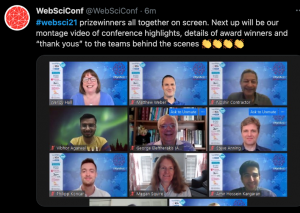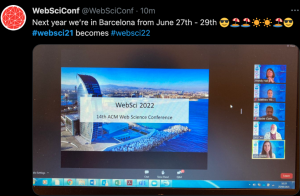#webSci21: Final day review
Spotlight Panel 6: Does Decentralisation Help the Disenfranchised?
Despite the advantages of blockchain technology, the world has experienced many self-serving projects profiteering from often desperate people in the name of decentralisation. This panel answered some hard questions regarding disenfranchisement and decentralisation.
When asked about the Trust’s role in this current wave of decentralisation which is actively challenging the Web’s current centralised state, Chairman of the Web Science Trust, JP Rangaswami urged researchers to remain focused on the formal structure of a scientific approach instead of an emotion-based, biased approach. He offered the example of being able to participate in any part of the “food spectrum” (buying, growing, procuring…) due to the freedom of choice in the enfranchisement without being controlled. However, when he looks around, he understands that not everyone else around him has the same enfranchisement. The preservation of dignity and freedom on the Web is a key matter to the Trust.
Another issue raised by Meltem Demirors was that of financial violence – which nowadays trumps physical violence. These coded social protocols exclude people from the financial system due to a number of factors and it was stated that we cannot have human rights in a world with no privacy, or financial access on the Web – we need to have privacy to preserve human rights. As a volunteer with iSpirt, Sanjay has been a key contributor to help create, and evangelise various government APIs, which are collectively referred to as the “India Stack”. These APIs have led to a digitisation of various processes, enabling them to become paperless, cashless and intangible. They have taken Indian citizens from 2 digital transactions per person to 25. By reducing the cost of the services, the service providers have been able to expand. For example – by reducing the cost of opening a bank account to single-digit rupees.
This then led to questions of identity… What should be included in someone’s digital identity? These massive companies don’t own our identities, they own identifiers and attributes, making identification possible. But what does it mean to “own everything” about ourselves online? For example the bank looks after our money and it’s their problem if we get hacked. But what would it mean if we got hacked and we were the sole owners of everything about ourselves? What people want according to Glenn Gore is portability.
Closing of Conference
Other highlights of the conference were mentioned and this was followed by the announcement that #WebSci22 will be held in the beautiful location of Barcelona.




